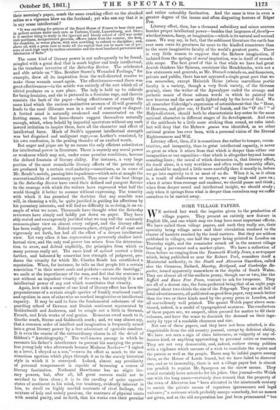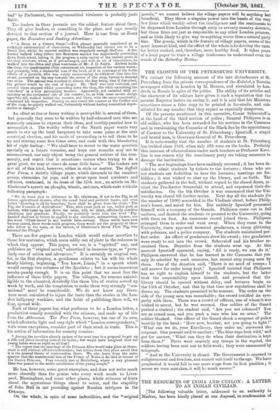SOME VILLAGE PAPERS.
WE noticed last week the impetus given to the production of village papers. They present an entirely new feature in English life, and one which may ere long have most important effects. We have called them village papers, and such they really are, their specialty being village news and their circulation confined to the cluster of hamlets reached by the local carriers. But they are seldom published in villages, one half the paper being printed in London on Thursday night, and the remainder struck off in the nearest village boasting a pavement and a market-place. We have a collection of them before us ranging from the Tamworlh Weekly News, a newspaper which, being published so near Sir Robert Peel, considers itself a Ministerial authority, to the Neath and ..elberavon Guardian, called also the Cwmaoon, Taibach, Haesteg, Bridgend, and Cowbridge Re- por, le r, issued apparently somewhere in the depths of South Wales. They are almost all of the uniform penny, though one or two, like the Suffolk and Essex Free Press, venture to ask for twopence. They are all of a decent size, the form preferred being that of an eight page journal about two-thirds the size of the Telegraph. They are all full of local advertisements, all published on good firm paper, very much better than the two or three kinds used by the penny press in London, and all marvellously well printed. The quaint Welsh paper above men- tioned, indeed, is a model of typographical neatness. The conductors of these papers are, we suspect, often pressed for matter to fill their columns, and have the sense to diminish the demand on their inge- nuity by type of a readable clearness and size. Not one of these papers, and they have not been selected, is dis- tinguishable from the old country, journal, except by deficient ability. We have not seen a sign of class bitterness, or vulgarity of any of- fensive kind, or anything approaching to personal satire or rancour. They are not very democratic, and, indeed, eschew strong politics with a vigilance which savours of a wish to conciliate the squire and the parson as well as the people. There may be infidel papers among them, as the House of Lords feared, but we have failed to discover one, and as to immorality, there is not a village paper but is almost too prudish to reprint Mr. Spurgeon on the shrew mouse. They would certainly leave asterisks for his jokes. One journal—the Welsh one with the long name—certainly does remark that the property of the town of Aberavon has " been alienated in the nineteenth century to enrich the private means of rapacious ignoramuses and legal vultures ;" a sentence which probably annoys somebody, but no names are given, and as the old corporation has just been pronounced "too
bad" by Parliament, the ungrammatical virulence is probably justi- fiable.
The leaders in these journals are the oddest feature about them. They all give leaders, or something in the place and type usually devoted to that section of a journal. Here is one from an Essex paper, the Braintree and Backing ddvertixer :
"'A Butz no A CIIMA Saar.'—This phrase generally considered as so strikingly emblematical of clumsiness, on Wednesday last turned out to be a literal fact, whilst its minted emblem was singularly enough libellous. A fine horned bullock being driven into Braintree market was majestically proceeding down Bank-street, taking in his progress a calm survey of the various goods in the shop windows, when, as if pre-arranged, and with an air of importance, he walked- into the china and glass warehouse of Mr. J. D. Smith. Arrived inside the shop, the quadrupedal critic commenced his inspection of the various wares ; and presently: with a disdainful toss of the head, as if in contempt of the feeble efforts of a juvenile, who was vainly endeavouring to withdraw him into the street, proceeded on las way towards the centre of the shop, having to descend two steps. The animal was watched in silence, the fear being, that if disturbed, the greater would be the risk of danger. Mr. Bull' was very collected, and several times stopped whilst proceeding down the shop, the while examining the 'crockery' in a very patronizing manner. Apparently, not satisfied with re- maining on the customers' side of the counter, he, as with some covert design upon'the till: walked behind the counter, and there, with the same equanimity, continued his inspection. Passing on, and round the counter at the further end of the shop, he quietly walked out, fortunately without having committed depre- dation or dwage."
An effort at fine or funny writing is perceptible in several of them, but generally they seem to be written by half-educated men who are earnestly anxious to express their ideas, and terribly puzzled how to accomplish it. The worthy editor of the Neath paper wants very much to stir up the local burgesses to take some pains at the next municipal election, and his mode of proceeding is to tell them to be up and stirring some five times over, and ends with this blundering bit of right feeling : " We shall have to revert to the water question specially on a future occasion, and hope our remarks may not be misconstrued, our only object being the general welfare of the com- munity, and regret that it sometimes occurs when trying to do a great good, we may at times do some little harm." The leaders are not all of this kind, however, either in style or matter. The Suffolk Free Press, a strictly village paper, which descends to the smallest gossip, chronicles fat pigs, and is great upon local accidents and offences, contained, in its issue of the 17th inst., an article on Mr. Gladstone's speech on ploughs, wheels, and oars, which ends with the following paragraph :
" We do trust that in deference to Mr. Gladstone, if not to the Pig, in all future agricultural dinners, after the usual loyal and patriotic toasts, and even before ' Breeding in all its branches ' there shall be given from the chair, ' The Pig, the Founder of Agriculture.' 'This, with roast pork at top, boiled pork at bottom, with hams up and down the table, will, we think, effectually combine Gladstone and gratitude. Finally, we positively insist that the word ' Pig- headed' shall not in future be applied to any obstinate, unimproving farmer, nor the word Chaw-bacon' to any loutish farm.servant. These words have now become sacred, these words mark progress, these words are the prverty of those who follow in the wake, or the furrow, of Gladstone's Great First Pig, who Invented the Plough."
There are few papers in London which would refuse insertion to those few sentences, which seem oddly out of place in the columns in which they appear. This paper, we see, is a "spirited" one, and publishes an "original novel," advertised in immense type, as "pecu- liarly one of action and adventure." It is certainly an original one, for, in the first chapter, a gentleman relates to his wife his whole family history, beginning, "You know, Lizzie," in a speech which would occupy two columns of the Spectator ; but it seems innocuous namby-pamby enough. It is on this point that we most fear the influence of these little papers. The villagers, for reasons unintel- ligible to the educated, decidedly like these bits of stories served up week by week, and the temptation to make them very strongly "sen- sational" must be considerable. We do not know any litera- ture more. calculated to injure the taste than the stories in the Lon- don halfpenny weeklies, and the habit of publishing them will, we fear, spread wide.
Each of these papers has what professes to be a London letter, a production usually compiled with the scissors, and made up of hits from the Atheneum. The Free Press, however, has one of its own, which affectsthe light and easy style which "London correspondents," with some exceptions, consider part of their stock in trade. This is his notion of information for country cousins :
" Among the novelties already spoken of for next year is a proposal to get up a rifle and pistol shooting contest for ladies; few would have imagined that our young ladies were so rapid as all that " The report that the marriage of the Princess Alice would take place at Darm- stadt is still without official confirmation; but letters from that place assert that it is the general theme of conversation there. We also learn' from the same quarter that the matrimonial fate of the Prince of Wales is decided in favour of the Danish Princess. They recently met at Heidelberg, where a very pleasant time was passed to the entire satisfaction of the young couple."
He has, however, some great exemplars, and does not write much more absutdly than the genius who every week sends to Liver- pool, Birmingham, and some other places, whole columns of hints about the mysterious things about to occur, and the stupidity of John Bull in not providing against- Russian intrigues in the Orkneys.
On the whole, in spite of some imbecilities, and the "original
novels," we cannot believe the village papers will be anything but beneficial. They throw a singular power into the hands of the very few firms which weekly select the intelligence and the sentiments to be dispersed from London through sixty or seventy country districts, but those firms are just as responsible as any other London printers, and as little likely to give way to anything worse than a natural party bias. The gossip, which is the feature of village papers, seems of the most innocent kind, and the effect of the whole is to develop the taste for better cooked, and, therefore, more healthy food. It takes years of a local paper to train a village tradesman to understand even the words of the Saturday Review.































 Previous page
Previous page